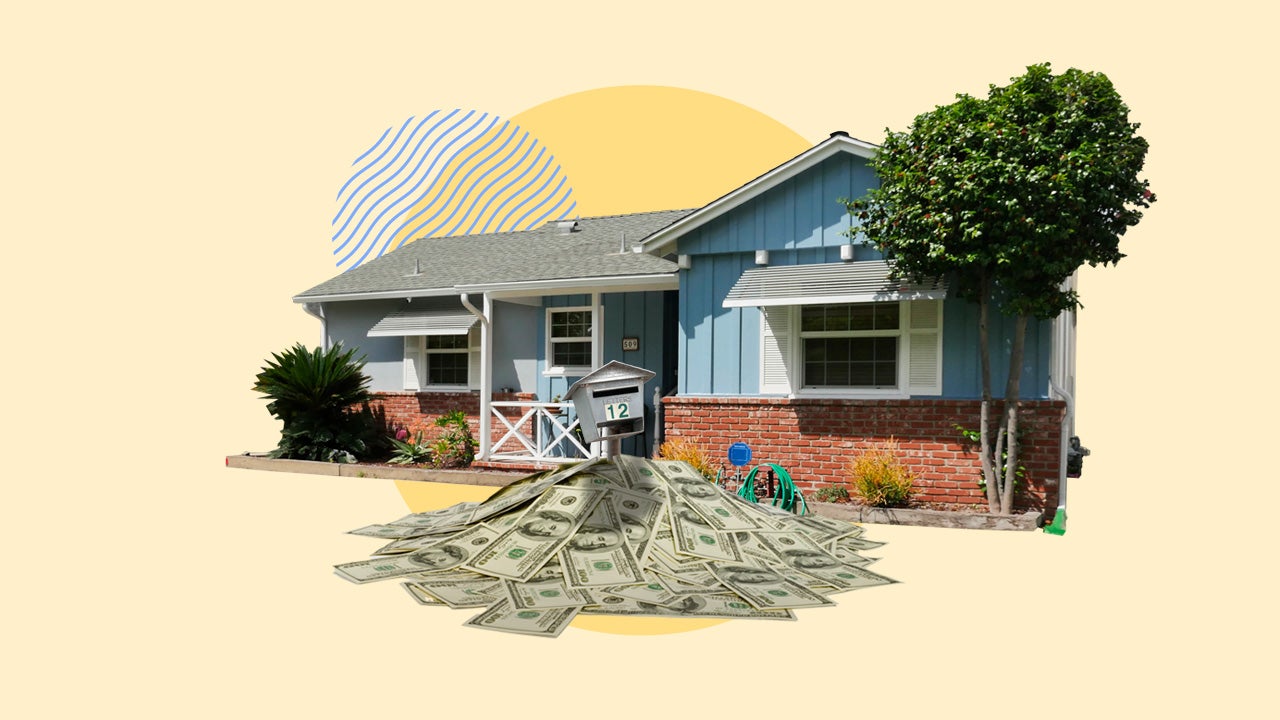8 ways to increase your home’s value




Key takeaways
- While your home’s value is determined by many factors, some home improvements could help increase its worth.
- There are multiple ways to pay for upgrades, including cash-out refinancing, a home equity loan or home improvement loan.
- If you plan to sell your home, it’s important to determine not just how much improvements will cost, but also how much of that cost you’ll recoup.
The value of your home can increase or decrease for a variety of reasons. Some variables are out of your control — like how hot your local housing market is or isn’t. But other variables may be within your control — namely, strategic upgrades to the premises.
Many home improvements can significantly increase your home’s value, boosting your equity stake. While they won’t all recoup their full cost, they definitely will make the house more marketable — and of course, improve your quality of life while you still occupy it.
8 ways to increase the value of your home
There are many ways to add value to your home. Some are simple and fast DIY jobs. Others require an upfront investment and the use of professionals.
1. Clean and declutter
To increase your home’s value, start by reducing the amount of stuff inside it. Cleaning and decluttering are relatively inexpensive tasks, even in bigger homes. Professionally cleaning a four-bedroom home averages between $200 and $225, according to HomeAdvisor, though it varies greatly by metro. Decluttering can cost anywhere from $300 to $800 if you hire a professional, depending on the size of your space and where you live.
Of course, you could save money by doing the work yourself. Start by going through cabinets and closets and making donation piles. Then clean out drawers and other storage areas, making sure you don’t keep anything you don’t need or want.
2. Add usable square footage
Homes are valued and priced by the livable square feet they contain, and the more livable square feet, the better, says Benjamin Ross, a Realtor and real estate investor based in Corpus Christi, Texas.
Adding a bathroom, a great room or another needed space to a home can increase function and add value. A separate in-law suite can also be a smart idea. “Most homes do not have this feature,” says Ross, “so adding one sets you apart from the competition when it is time to sell.”
The cost of an addition varies, but typically ranges from about $21,936 to $83,356 — though, of course, you can easily spend six figures, depending on the size and nature of the add-on.
3. Make your home more energy-efficient
Projects that lower utility bills can increase the value of your home. And they don’t have to be complicated.
Improve your home’s efficiency and value by replacing old, leaky windows, installing energy-efficient home appliances and insulating walls. Swap out old incandescent bulbs for energy-efficient LEDs, which last longer and use less electricity.
If you have some extra cash, you can invest in solar panels. While there might be high upfront costs, they can reduce your electricity bill and reliance on the grid by tapping free solar energy. Solar panels can also increase the value of your home in areas with elevated energy costs and help it sell faster than those without the upgrades.
You could start this process by having an energy audit of your home conducted, which costs about $437 and involves a professional conducting a detailed inspection of where your home is losing energy. According to Angi, these audits often reveal a variety of areas where improvements can be made, including:
- Air sealing: $350 to $1,000
- Insulation upgrades: $1,200 to $3,000
- Duct repairs and sealing: $500 to $2,000
- HVAC repairs: $150 to $1,500
The timeline for these projects varies. For instance, duct sealing takes two to eight hours, while HVAC repairs can take one to two hours per task. But these timelines vary based on the size and complexity of your home.
4. Spruce it up with fresh paint
A fresh coat of paint can make even dated exteriors and interiors look new again. The average cost of exterior painting is $3,178, according to Angi. Interior painting costs average around $2,022.
Your exact painting budget will depend on a number of factors, including the materials, labor fees and size of your home.
Angi pegs painting a bathroom — usually the smallest room in the house — at somewhere between $200 and $400, while a living room might cost as much as $2,000.
If you just want to repaint a door or a single room, doing it yourself could cost you between $135 and $300. But for bigger jobs, especially exterior ones, hiring a painter might be worth it, since professionals can buy paint at wholesale prices, know what sort of finishes to use and are more adept at scaling ladders.
The timeline for each of these projects varies significantly. For instance, a professional painting company may be able to paint your house in three to four days, while painting a room in your home can take anywhere from two to eight hours, depending on room size and materials.
These projects can provide a valuable return on investment (ROI). Interior painting, for instance, can provide a return as high as 107 percent, while the ROI for exterior painting is about 50 percent.
5. Work on your curb appeal
From power washing your driveway to mowing the lawn, improving curb appeal can make a big difference in your home’s value.
Upgrading your landscape can go an especially long way, says Joe Raboine, vice president of Design at Oldcastle APG, a manufacturer of exterior building products. A fresh walkway, shrubs, planters, mulching or even a new patio or outdoor kitchen can give your home a needed facelift, but even small details like a new mailbox, light fixtures, solar-powered path lights or a new house number sign can make a world of difference.
Landscaping to improve curb appeal can cost anywhere from $781 to more than $2,100, according to Angi. These types of projects can deliver a powerful return on your investment of up to 200 percent.
6. Upgrade your exterior doors
Continuing the theme of curb appeal, replacing an old front door can give your home a fresh look. “The front of the home is the first thing you, your neighbors and prospective buyers will see,” says Randy Oliver, president of Hollywood-Crawford Door Company.
Don’t forget the garage doors, he adds. “Garage doors often take up the most amount of space on the front of your home, so installing a modern glass panel door or a rustic wood door will dramatically improve your home’s appearance.”
The cost of a new garage door can run anywhere from $754 to $1698. These jobs offer one of the highest ROIs among home renovations, as much as 194 percent, according to Angi.
7. Update your kitchen
Many buyers zero in on the kitchen as the central feature of a home, so if yours is outdated, it can ultimately affect how much you garner from a sale. Likewise, if you aren’t able to utilize your kitchen fully due to layout, space or other concerns, you won’t be maximizing the space.
But this project can be costly, and you likely won’t get back every dollar you invest. Mid-range or modest upgrades come closest and actually offer a better ROI than the most elaborate ones. A minor kitchen remodel costs around $10,000 to $20,000 and provides about 96 percent return on your investment when it’s time to sell, according to Angi. The timeline for this project can range from six to 10 weeks.
If updating your entire kitchen is too big of an undertaking, even small changes could still have an impact — consider coordinating appliances and installing modern hardware on your cabinets.
8. Install smart technology
State-of-the-art smart appliances, systems and devices — which can “read” conditions in your home and make automatic adjustments — can help you reduce energy consumption, enhancing your home’s value and saving you money.
By installing a smart thermostat, for example, you can adjust your home’s temperature based on a schedule. It can cost between $113 and $264 to make this quick upgrade, according to Angi. However, you could make that money back fairly quickly. According to Energy Star, a smart thermostat can save families an average of 8 percent on their energy bills, or about $50 a year. Based on your heating and cooling equipment, personal comfort preferences and other factors, the savings could be even higher. Installation is also relatively straightforward, taking only 30 to 45 minutes, though doing it yourself could take as long as one to three hours.
Then there are smart window treatments, shades and blinds that automatically change position with the weather. By adjusting your blinds to the amount of sun (and hence heat) pouring through a window at a given time, you can significantly affect a room’s temperature, alleviating the need to crank up the AC or the heating.
Reasons to increase your home value
Your home is likely one of your largest assets, so increasing its value contributes to your overall net worth. Raising your home’s value has other benefits, as well, such as:
- More profit when you sell: A higher home value translates to a higher asking price when you put the place on the market.
- More tappable home equity: If you need cash, you can borrow against your home’s equity. The more your home is worth, the more you can potentially borrow.
- Some protection from market swings: If your home has a higher value, you might be able to guard against major dips in the housing market.
- No more mortgage insurance: If your home appraises for a higher value, it increases your equity stake, potentially to a level that leads to the elimination of private mortgage insurance premiums.
- Aesthetics and function: Upgrades increase your enjoyment and use of your home.
$15,000
Source: Fixr Home Remodeling Statistics 2025
How to pay for home improvements to increase value
There are many ways to finance home improvements. According to the 2025 U.S. Houzz and Home Study, cash (from savings) remains the most common way to pay for renovation projects (used 84 percent of the time), followed by credit cards (29 percent) and secured loans like home equity financing (12 percent).
0% APR credit card
Best for: Homeowners focused on smaller projects
A 0% APR credit card charges no interest on balances for a set period, often up to 18 months. Just remember: If you don’t pay your balance off by the time your zero-percent APR offer ends, your card’s interest rate will reset to a higher variable rate, costing you more.
This option can be ideal if you have a smaller-scale project in mind — one that you can pay off by the time the interest-free period ends. A credit card can also work well if you’re able to pay your contractor with it.
Home equity loan or HELOC
Best for: Those with sufficient home equity who want a lower interest rates
Home equity loans offer a lump sum of cash at a fixed interest rate and a predictable monthly payment. Home equity lines of credit, or HELOCs, work like credit cards — a revolving balance that you can draw on at different intervals — and come with variable rates.
Both borrowing options require you to put your home up as collateral to qualify. They carry lower interest rates than credit cards or personal loans, and the interest might be deductible if you use the money to make eligible home improvements.
These are good options for homeowners who’ve paid off much of their mortgage and have a significant amount of equity to borrow against.
Cash-out refinance
Best for: Homeowners who can qualify for a lower mortgage rate than they’re currently paying
A cash-out refinance involves swapping your old mortgage for a new, larger one and receiving the difference in cash. The extra amount is based on the size of your home equity stake. The refinancing process is just as paperwork-heavy as taking out a mortgage, and you’ll need to pay closing costs.
The most elaborate and time-consuming method, a cash-out refi works best for big projects, and if you were thinking of refinancing anyway — perhaps because of a dip in interest rates since your original mortgage. It’s a good option for homeowners who own significant equity in their home and who don’t mind continuing to pay off their mortgage for a few more years.
Personal loan
Best for: Borrowers with good credit who don’t want to borrow against their home
Personal loans allow you to borrow a fixed amount at a fixed interest rate, similar to a personal loan. But these loans are unsecured, meaning you don’t have to put your home or other property up as collateral. Many personal loan lenders allow you to borrow as much as $50,000 for home improvements — sometimes more, depending on your credit and other factors.
If you have good credit and want to get funds relatively quickly (sometimes the same day you apply), a personal loan can be the simplest, easiest way to go.
Bottom line
Home renovations can indeed increase your home’s value, but not all projects provide the same return on your investment. Before beginning a home renovation project, do your research and find out how much you’re likely to benefit from the money you’re spending.
Frequently asked questions
Why we ask for feedback Your feedback helps us improve our content and services. It takes less than a minute to complete.
Your responses are anonymous and will only be used for improving our website.
You may also like

Reasons not to tap your home equity




